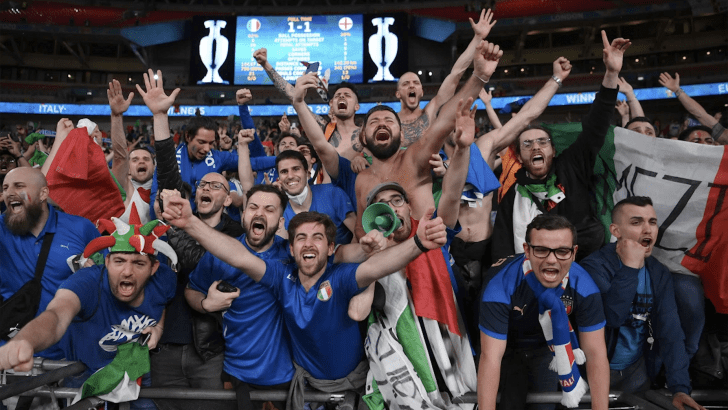I’m not sure I could give a coherent description of the protocols of association football, were I quizzed on the subject: the ‘off-side’ rule has been explained to me many times, but I still don’t quite grasp it.
It was lovely to see the euphoric delight expressed by the Italian fans in celebration”
And yet, like millions of others, I followed the course of the Euro finals between England and Italy at Wembley last weekend. I think part of the motive was simply participation. I was drawn to participate in a collective event which drew huge crowds people all over Europe. I wasn’t invested emotionally in either side: I just wanted to be part of something big after experiencing so many months of feeling locked up in my own little world, with social and cultural events so restricted, or only allowed under certain circumstances, and under constant surveillance and regulation.
May the best team win, was my approach – and by common consent, the best team, Italy, did win. It was lovely to see the euphoric delight expressed by the Italian fans in celebration. Vicariously, I could be part of that, too.
Football – like any other team sport – is a metaphor of life. There are happy times, and there are times of crestfallen disappointment. There are those who behave well – and there are those who behave badly. There is discipline in the play, and team spirit, but also individuals who shine.
And although it involves pride in patriotism, there is also a sense of internationalism which isn’t phoney or imposed by globalised treaty. Football fans who might not be great students of history or even geography can provide chapter and verse about Leonardo Spinazzola, Simon Kjaer, or Jérémy Doku.
Community
We need that sense of sharing, community, collective joy, disappointment, and feeling involved with something bigger than ourselves. We need to feel the experience that ‘no man is an island’ – and to look beyond our own island life too.
***
It’s not often you hear a sermon these days denouncing adultery, or attacking divorce. The priest and the pastor have become more sensitive to personal feelings, and more aware of not being judgemental about individuals – since the New Testament tells us not to judge, lest we be judged.
Yet judgement may come from other quarters – sometimes the most unexpected ones. A 75-year-old English grandmother, Jenny Tarrant, has written to The Financial Times – an impeccably liberal publication – explaining why she takes a ‘hardline’ view on the breakup of marriage, and the consequences she has observed in her own ‘patchwork’ family. “Two of my siblings changed spouses. One of our children has children by three different people. Our grandchildren all have half- and step-siblings the other way. So much pain. So much disruption. Have you watched a beloved child have its nest broken? Or felt the emotions of an outsider in the family as the one born to adultery? No, it is not OK!”
Such an outspoken, robust, even distressing avowal. “They say the trouble with trouble is that it starts out as fun. Add blinkers, and a parental example of brainless self-interest and one has an insecure, weakened and unhappy world that does not know right from wrong, or the meaning of love.”
“The trouble with trouble is that it starts out as fun” are tough words, but I could identify with them. No hellfire preacher could have hit home with such chilling truth.
Shakespeare’s Catholic background
William Shakespeare’s father was a baptised Catholic, but when the Tudors began to suppress English Catholicism, it seems that he moved prudently to conceal his faith. Dr Jonathan Foyle, an architectural historian, has found the fragments of a Last Supper painting on the classroom walls of Will Shakespeare’s school at Stratford. But his father, John, as a town official had it painted over, so that it was no longer visible to the authorities. The last supper was frequently depicted on images in monasteries, and it would have been strongly associated with ‘Papist’ traditions.
Bio
William Shakespeare was born in 1564, and by the time he was in his twenties, in the 1580s, it was certainly not ‘politically correct’ to be a Catholic, and he disappeared from view for about seven years (he may have gone to Italy, or worked as a private tutor to a recusant family.) Perhaps his father, John, felt he was protecting his son from Tudor religious enforcement by occluding the image. But by the skill of modern artistic forensics, its existence has now been rediscovered.


 Mary Kenny
Mary Kenny Italian fans celebrate after Sunday’s final.
Italian fans celebrate after Sunday’s final. 